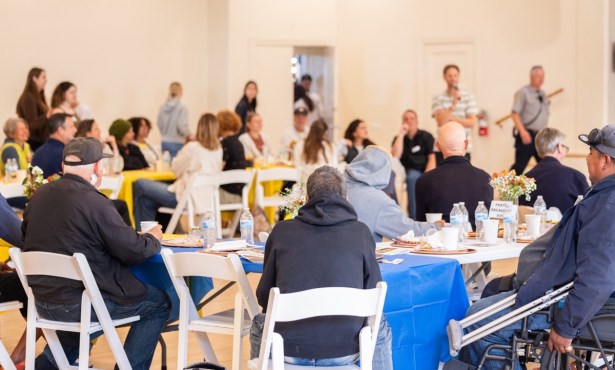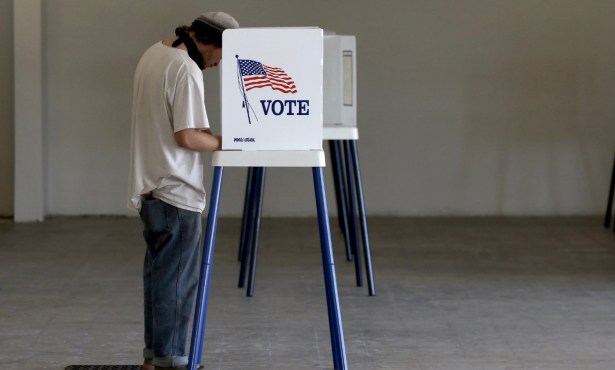Love Me, Love My Dog
Poodle Perseverates Over Irrational Rationing
DIMINISHED CAPACITY: Living through a drought, for those who haven’t had the pleasure, is a lot like being water-boarded. Only in reverse. And as with water-boarding and all forms of enhanced interrogation, the experts tell us, the rational response is to give up immediately and tell all. You’ll do so eventually, they recognize, so why not spare yourself the pain? The problem with this theory is that your tormentors will still think you’re holding back and your agonies will continue. For some reason, this tortured comparison wouldn’t leave me alone as I attended this week’s standing-room-only meeting of the Montecito Water Board.

For those tuning in late, we’re currently in the throes of a Drought-zilla of mega-paleo proportions, thanks to back-to-back, record-setting dry years, the likes of which we may not have seen since 1580. Montecito, by dint of its shallow underground water table — drilled to perdition by private well owners, and a relatively tiny (not to mention almost empty) reservoir — is especially vulnerable to fluctuations in water supply. Twenty years ago, county water agencies — Montecito’s included — agreed to pony up $50 million a year to build the pumps and pipes needed to import state water from the Feather River in Northern California as insurance against just this nightmare contingency. At the time, a few loud I-told-ya-sos warned this plan made no sense; if Santa Barbara was out of water, they argued, the rest of the state would be, too. In that scenario, our expensive insurance policy — all those pipes and pumps — would be totally worthless. Technically speaking, the jury remains out on this. But for now, the I-told-ya-so crowd seems to have the last word. For the first time since the dawn of time, the state water system will be delivering zero water.
Zilch.
That’s historic.
For the lushly landscaped Montecito — where every home is a three-acre arboretum — this is a catastrophe. District managers are warning that supplies could go bone dry by the middle of July unless serious action is taken if not now, then yesterday. This, it goes without saying, cannot be happening. We all know that 17 water districts throughout the state are currently threatening to run out of water before the year’s out. But they’re tiny one-well operations located behind the Podunk curtain serving trailer park residents, immigrant farm workers, and others conspicuously without means. What they aren’t is Montecito, home to $16 billion worth of assessed real estate and more billionaires and millionaires per square inch than all but 19 communities nationwide. Surely if Montecito has a water problem, it could simply buy some. For the time being — though this may change — none’s for sale. Not at any price.
While other water agencies throughout the South Coast are politely asking residents to begin thinking about perhaps taking shorter showers and watering their lawns at sunset, the Montecito Water Board is already poised to pass a rationing ordinance. That’s serious. It would have done so this Tuesday evening if a few board members hadn’t eaten up the clock with a virtuoso display of hair-splitting and wordsmith-ery. They’ll probably finish the job this Friday. When they do, everyone will have to cut back water use by 30 percent. Those that don’t will be fined and then fined some more. Those that persist will have flow-restrictors attached to their pipes, physically limiting how much water they get. Those who persist further face the extreme sanction of service termination.
The bold, sudden swiftness with which Montecito (almost) took action called to mind the aforementioned torture scenario. I had to wonder — like the interrogator contemplating which enhanced interrogation techniques he might deploy — how much was being held back. Quite a lot, it turns out. For indoor uses — drinking, bathing, showering, scrubbing vegetables, flushing, and some indeterminate “irrigation buffer” fudge factor, the rationing ordinance sets aside about 3,000 acre-feet, roughly half the district’s usual demand. Fine and dandy. At issue remains the 1,446 acre-feet that will still be allowed for landscaping and how that reduced amount will be divided among competing uses. Much was made Tuesday about “equality of sacrifice,” but whether the reality matched the rhetoric remains a matter of perspective. For those engaged in agriculture — and remember the district now includes Summerland, home to many avocado orchards — their “equality of sacrifice” will be much more devastating than that of Montecito homeowners, 5 percent of whom, it turns out, use 25 percent of the district’s water. Just three estates, we were told, use 92 acre-feet a year, enough to supply 276 families living a less luxurious lifestyle. District managers sternly stressed that these profligate consumers would be brought in line just like everyone or else. But I also get how this might not pass the “even-Steven” test. The farmers are looking at being put out of business. Once their trees are dead, that’s probably forever. The homeowners, by contrast, are looking at living with brown lawns and enduring a less radiant palate of landscaping colors. The justification given for screwing the farmers — provided by the district’s special counsel on hand via speakerphone — was that the farmers were never charged their fair share for the importation of the now famously nonexistent state water. Ouch.
In the interest of full disclosure, I left before the meeting was over. I was hungry and grouchy. I get people loving their landscaping; who wouldn’t? But if the situation is really as dire as district managers say — dry by July — it seemed like an awful lot of water was being left on the table. Maybe some of that will be needed come October when Montecito’s delivery of water from Lake Cachuma is scheduled to get cut in half. That will pack the same punch, by the way, as no state water. Montecitans are famous for knowing people in high places, but can they really make it rain in August? It dawned on me during that meeting there are two kinds of water-boarding, and one needs water. Good thing for me we’re in a drought



